Original URL: https://www.theregister.com/2011/07/18/verity_stob_pgpdip/
Educating Verity the OU way
'The skin of my C++ custard remained unruffled'
Posted in Columnists, 18th July 2011 10:00 GMT
Stob I think I mentioned that I was doing an Open University PGDip course in software development. (For those not familiar with the institution, the Open University has rightly been described as a sort of mental gym. You join with great enthusiasm; then, after three months, having attended just twice, you can drop out and ask for the balance of your subscription back.)
Well, after four years at it, I have finally finished, and want to share.
One of the skills we were encouraged to develop was the writing of highly compressed summaries. So here is the essence of all eight modules, 23 homeworks and any number of learning outcomes, bullet points, bolded key terms and self assessment questions – zipped up into one Reg article.
You may not learn quite as much as from the real thing; on the other hand, my version is £8k cheaper.
Oh, and I have carefully included cover illustrations from each of the modules, to enable you not to judge the content by them, and in support of a theory of my own viz that graphic designers as a profession don't half put out some rubbish when required to portray software development procedures.
After Rita
Forget about Michael Caine and Julie Walters and all that. There are no cosy, one-to-one tutorials in book-lined studies, with Johnnie Walker bottles hidden behind the TS Eliot. Nor yet are there 2am lectures on BBC2, presented by black-and-white professors wearing '70s sideburns and kipper ties.
Nope, there are three main planks to an OU PostGradBizCompSci course:
- reading the text;
- doing the homework; and
- suffering the exam.
All this with not much interaction with anybody, although you do have the right to email your tutor, and to participate in rather desultory online forums. The OU is not an alternative to social networking: more CutOff than LinkedIn.
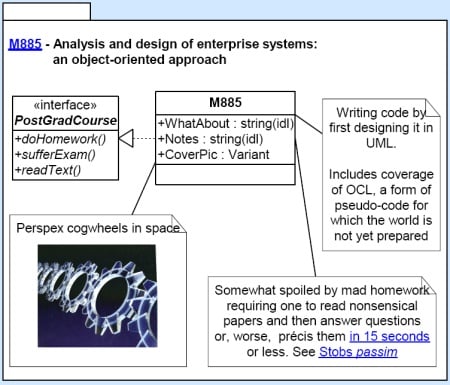
The modules available to us D69 students divide into two broad categories: "hard" technical topics (OO, databases, web), where you get to dirty your hands with code; and "soft" humanity-oriented topics (UI, requirements, management), where you don't.
SAQ
Propose a framework to distinguish between "hard" and "soft" topics.
Here is a simple test that we devised; there may be other correct answers.
Are there pages somewhere in the module text advocating the delights of "brainstorming"? If so, you may be sure you are on a "soft" module, which cannot resist recommending the technique. Whereas nobody advocates writing code by having everyone stand around and shout out their random ideas. (Although, as it happens, this is a much more effective technique than, say, CASE tools.)
As a hater of essay-writing, I was drawn to the cheerful, puzzle-solving ground of the "hard" subjects. But actually, excepting the SQL module, there really isn't much puzzling. I exaggerated with that "dirtying your hands" back there: the most you can expect is a light smearing. Java is adopted as the lingua franca, but never in sufficient depth as to ruffle the skin of my C++ custard.
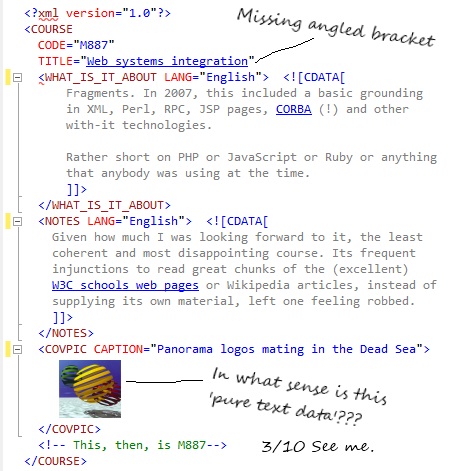
But it was on the "soft" courses that I learned the most. For example, the software management module M882 included the following nugget which, shamefully, was quite unfamiliar to me (and shame on Wiki too, for doubting its notability). Meir M "Manny" Lehman's Software Uncertainty Principle possesses that strong indicator of a top-notch insight: once explained, duh, the thing is obvious.
CASE STUDY: Brother Lehman's Uncertainty
Brutally summarised, Lehman says: as you code, you weld into your program certain assumptions about the universe. Osmium is the heaviest metal, VAT is 17.5%, Windows stores custom properties of files in alternate NTFS data streams, night follows day. As time passes, some of these assumptions inevitably fail, and so, equally inevitably, the once-reliable program ceases to work properly. Of course, if you are aware of a dodgy assumption at the start, you can protect yourself or hoick it out; but the universe is infinite and your program isn't, so you can never get them all.
Thus it is that software rusting is explained: real-world applications can, and eventually will, go from working to not-working without flipping a single bit. Encapsulated inside them are the now-wrong assumptions, like fossil insects in amber. No, that's not right. One can see through amber. They are like fossil ferns embedded in coal, which can only be rediscovered by smashing the lump with a hammer.
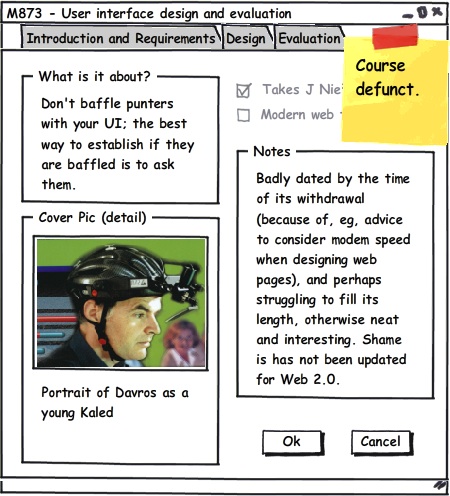
The text
When choosing an OU module, prefer those with real printed textbooks over those which just offer web pages and PDFs. I have in-depth justification for this Luddite attitude:
- The best place and time to do undisturbed OU reading is: any short period of otherwise useless free time, for example while sitting in the park, chewing your lunchtime sarnie, stoically enduring the drizzle. Now, are you really going to expose the spanking new iKindle 3.0, which in your case you do not have, to the hostile environment of a wet Wednesday Wouldbemugged Green?
- In order for them to be absorbed, OU texts need to be annotated with Post-its and marginal scribbles and highlighter daubs containing remarks such as "Oh yeah" and "Sez who?". This only really works if you are actively vandalising a proper book.
- You need to start the course by printing out the errata from the OU website and sticking them into the books with little bits of sticky tape. (See next bit for justification.)
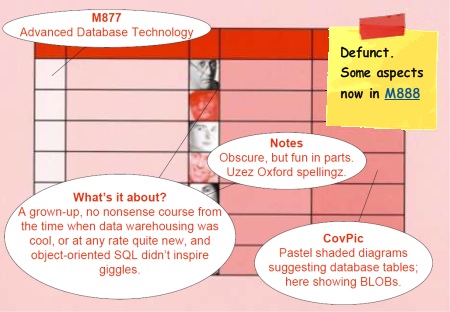
CASE STUDY: Subversion subversion
As a student, be sure to take note of the errors in the text, both pre-supplied errata and those you may discover yourself. They are important. Not for the mistakes themselves, which are usually trivial, but because of the implied meta-data. A mistake can hint that the authors and reviewers weren't much interested in the material, which means, in the context of the course, you probably shouldn't be either.
An example. Figure 11.7 of M882 (again) is a moderately complex schematic of the VCS Subversion. A pain to memorise. Yet on the very next page of text, there is prehistoric advice on storing details of code changes in header comments, and how to use a Perl script and regexs to build these into a change history.
The astute student will conclude that the course writers were unaware that Subversion (or any VCS) can trivially give you a change history for the asking, without any 1980s-style grepping through headers. Hence time spent mastering Subversion's architecture will not result in M882 gains any more than, say, watching Top Gear repeats on Dave. They aren't going to test you on subjects they don't themselves grasp.
It is by such observation, combined with other frowned-upon gambits such as analysis of past papers, that one can pass handsomely without letting the OU study become a hopeless time sink.
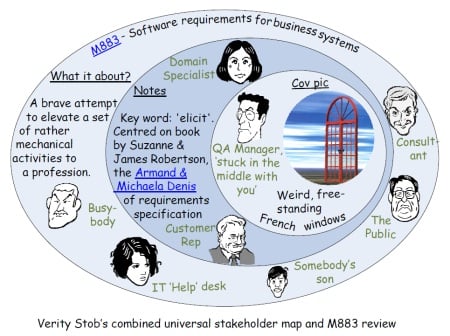
Certain characteristics of OU texts can be quite amusing. Their pompous vocabulary goes beyond even the requirements of academia. For example, they freely employ the word pedagogical, apparently not realising that its use is reserved to those strange and seedy schoolmasters who appear in early Evelyn Waugh and Aldous Huxley novels.
Another peculiarity: every few paragraphs they put in an SAQ – a Self Assessment Question – so that you can test yourself on what you have just read. Fair enough. But, excepting those occasions when I already happened to know the correct answer due to prior knowledge, I could hardly ever answer these. There simply hadn't been enough information, or rather, they expect you to deduce too much from too little.
CASE STUDY: O-level physics with Nuffield
During my O-level years, an organisation called Nuffield used to teach physics in a quixotic way: by first providing a picture of an apple tree, then letting us observe a short black-and-white film of the descent of an unsupported fruit, and finally inviting us kids to infer the existence of an inverse square law. Or something not far short of this.
It was as though they didn't take the reported intellect of Sir Isaac and chums seriously, and supposed every infant to be independently capable of digesting the implications of a falling Cox's Orange Pippin. They forgot that acquired knowledge looks much smaller in the rear view mirror than it does on the approach.
The OU is also a child of the 1960s and 1970s, and I think it is time it shook this habit.
EMPIRICAL HEURISTIC OBSERVATION
Don't fret if you struggle with OU SAQs.
They are only for students who already know the answer.
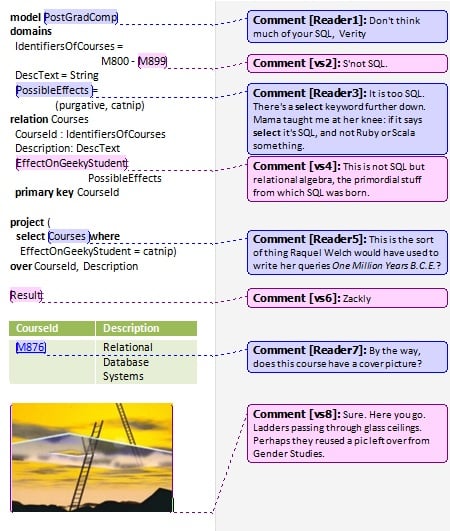
Battling the inner student
As one reads an OU text, one is supposed to make one's own notes. This is a very effective way to comprehend and absorb information.
But I just can't do it. I am haunted by an inner student with a siren voice, who:
- Is ok with education in theory, but
- forbids starting homework until the last possible moment, and
- absolutely will not countenance the making of notes from printed text. "What's the point of that? You know you will never read them back, even in revision. I mean, it's not like the textbook is going to go away, is it?" she says.
I suspect I am not the only one thus afflicted by this daemon of laziness. But there are ways around.
EMPIRICAL HEURISTIC OBSERVATION
Write quizzes not notes.
Super Memo is an excellent memorising program that allows you to test yourself daily, playing back questions at special intervals calculated to allow the maximum amount of information be absorbed for the minimum effort. Questions that you flunk come around more often, until they are mastered.
Instead of taking notes, as I read each chapter I condensed it into the form of a quiz using these rules. Then I uploaded the questions to my old Palm Treo smartish phone, ready for use anywhere, anytime.
This technique was acceptable to the inner student, because she has to admit that by creating a quiz that runs on my phone, we were making something new and distinct, and not "wasting time" producing an inferior version of an existing resource. And although she hated the work involved, even she admitted it is worth it to avoid going into the exam underprepared.
ACTIVITY
Read this Wired article about the bloke who invented the SuperMemo algorithm. Decide whether or not you believe it. Me? Of course I believe it. Gullible's Travels, that's me.
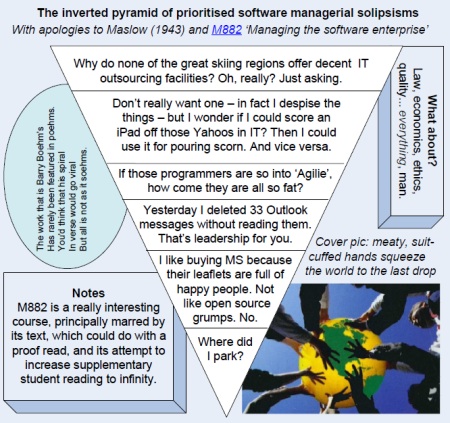
The exam
OU exams are the proper deal: three hours on a hard chair at a wonky desk in a big hall with lots of other sufferers and a Rosa Klebb up at the front, invigilating firmly. At one point, there was a craze for having one's mobile phone go off halfway through, but these days Rosa seems to have got a grip: miscreants know they can expect two or three swift kicks in the shin with the poisoned spikes concealed in the toecaps of her sensible shoes.
Note that there is a ban on mobile phones at your desk, so you won't be able to use your smartphone as a calculator.
EMPIRICAL HEURISTIC OBSERVATION
Sort out an old-fashioned calculator well before you start out for the exam.
That way you won't do what, ahem, somebody did, and at the last minute accidentally and idiotically grab the online banking passcode generator gadget.
CASE STUDY: Living the exam dream
Someone asked on the module's web discussion board, about 24 hours before the off: "We are allowed to take in the course textbooks, aren't we?"
Thus he got to experience in real life what has been my "favourite" anxiety-induced nightmare for 30 years. Except I guess he probably chose to wear his clothes for the ordeal.
One thing that has changed since the exams of my youth: everybody (except me) now solemnly brings in a plastic bottle of water and places it on his or her desk. Why? An examination is not an arid desert that must be crossed. You don't get thirsty in three hours – not if you are concentrating on the matter in hand, you don't. Wimps.
CASE STUDY: Picnic
The girl at the desk next to me in the last exam brought in a complete picnic:
- bottle isotonic Lucozade as no longer aids recovery;
- bottle mineral water in case the Lucozade ran out;
- Marks & Sparks luxury fruit salad with watermelon;
- huge American-style chocolate muffin; and
- bag of sweeties.
I looked up at the end, and she had scoffed the lot.
Remember the fuss they made when Rebecca Upton smuggled a packet of Spangles into A-level Geography? I begin to understand how society has gone to the dogs.
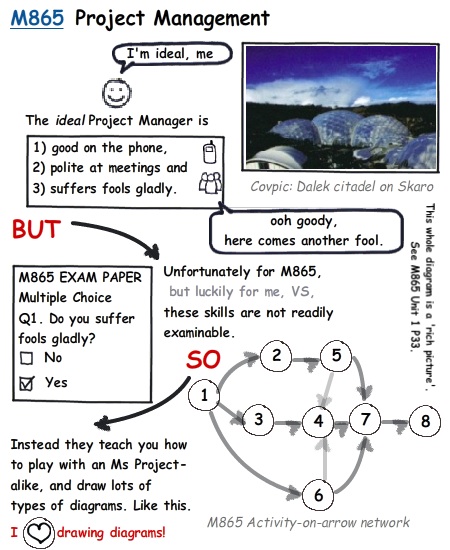
Learning outcome
Although some courses come with graduation ceremonies and opportunities to be photographed looking a prat in a mortar board and gown, I believe this not to be the case with a PGDip, and regard this as an advantage of the qualification.
SAQ
What is the main practical use of a photo of someone dressed in mortar board and gown?
The BBC prefers this format when selecting photos of murder victims shown on TV news bulletins and Crimewatch UK.
But despite all the homework traumas and exam panics, I really did enjoy the experience, and would recommend it.
Which is decent of me, actually. Got an e from the OU while I was finishing this article. I eagerly clicked it open, expecting congratulations on my glorious completion of all the necessary modules. But no. It was a message from the results-awarding computer, quite wrongly telling me that I was out of time to finish my registered course, so I could sod off, see if it cared.
Yup, these are definitely the boys to go to if you want to learn how to make great software... ®